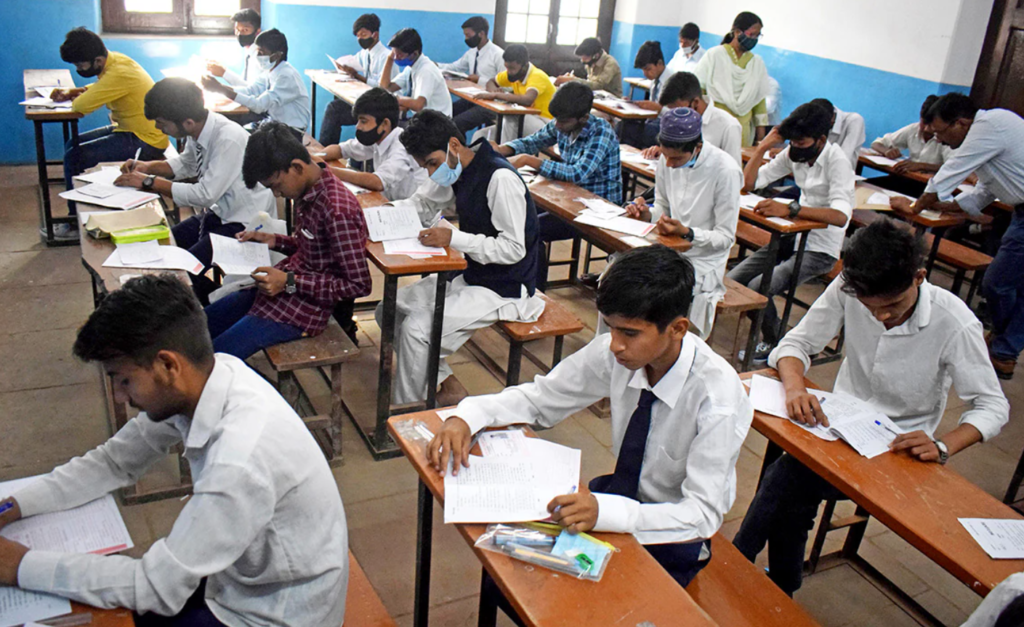Table of Contents
The CBSE Board Exams Reform 2025 is set to bring a significant shift in India’s education system, with the Central Board of Secondary Education (CBSE) announcing that Class X board exams will be conducted twice a year from the 2026-27 academic session. This reform aims to ease the burden on students, offer them multiple attempts to improve scores, and align the examination system with global best practices.
In this article, we will delve into the details of this reform, its impact on students, parents, and educators, and how it aligns with the New Education Policy (NEP) 2020.

Understanding the CBSE Board Exams Reform
The CBSE has been working towards making the education system more flexible and student-centric. The latest decision to hold Class X board exams twice a year follows the vision set by the NEP 2020, which emphasizes reducing academic pressure and encouraging holistic learning.
Key Highlights of the Reform:
- Two Board Exams Per Year: Starting from the 2026-27 session, students will have the opportunity to take their board exams twice a year, similar to competitive exams like JEE and SAT.
- Best Score Retained: Students can appear for both exams and retain their best score, allowing them to improve without the fear of failure.
- Reduced Stress: The new system aims to alleviate exam stress by providing students with a second chance within the same academic year.
- Alignment with NEP 2020: The reform aligns with the principles of NEP 2020, which advocates a more flexible and skill-based assessment system.
Why CBSE is Introducing This Reform?
The traditional Indian education system has been heavily dependent on a single high-stakes exam, which often leads to extreme stress among students. Several factors contributed to the CBSE Board Exams Reform:
1. Reducing Exam Stress Among Students
One of the primary reasons for conducting board exams twice a year is to lower the immense pressure that students face during their board exams. The fear of failure in a single attempt often leads to anxiety, stress, and in some cases, mental health issues.
2. Providing a Second Opportunity Without Losing a Year
Currently, if a student underperforms in the board exams, they either have to repeat the year or settle for lower academic prospects. With the new system, students can take another attempt within the same academic year and improve their performance.
3. Bringing Indian Education at Par with Global Standards
Many international education systems, such as those in the US and UK, allow students multiple attempts in standardized testing. This reform will make Indian board exams more flexible and globally competitive.
4. Encouraging Skill-Based Learning
With reduced pressure, students can focus more on conceptual learning rather than rote memorization. The CBSE Board Exams Reform aims to promote skill-based education and critical thinking, which is a key aspect of the NEP 2020.
Impact of the Reform on Students and Parents
Benefits for Students
- Reduced Pressure: Students will have a second chance to improve their scores, reducing anxiety.
- Improved Performance: More opportunities mean students can better showcase their knowledge and capabilities.
- Better Preparation for Competitive Exams: The practice of multiple attempts will prepare students for future entrance exams like JEE, NEET, and CUET.
- Encourages Conceptual Learning: Since students will not be limited to a single attempt, they can focus on truly understanding concepts rather than mugging up answers.
Concerns of Parents and Educators
- Additional Coaching Expenses: Parents may worry about the extra cost of coaching classes for two exams.
- Increased Burden on Teachers: Conducting two board exams will require more effort from educators in terms of teaching, grading, and exam administration.
- Classroom Time Management: Schools may have to restructure their academic calendar to accommodate two board exams.
Implementation and Challenges
While the reform is student-friendly, its successful execution depends on several factors:
1. Proper Scheduling of Exams
CBSE will need to ensure that the two board exams are scheduled in a way that doesn’t interfere with the academic calendar.
2. Training of Teachers
Teachers need to be trained to adapt to the new system and provide guidance to students on how to prepare effectively for multiple attempts.
3. Infrastructure and Logistics
Managing two sets of board exams will require better infrastructure, logistics, and administrative resources.
4. Acceptance by Higher Education Institutions
Colleges and universities will need to update their admission criteria to accommodate students who have appeared for multiple board exams within the same year.
How Students Can Prepare for the New System
With the introduction of board exams twice a year, students should adopt a new approach to their studies:
- Focus on Conceptual Learning: With multiple attempts available, students should prioritize understanding concepts instead of cramming.
- Time Management: Since they will have the option of reappearing for exams, students should plan their study schedules efficiently.
- Mock Tests and Self-Evaluation: Taking regular mock tests will help in identifying weak areas and improving scores in the second attempt.
- Seeking Guidance: Teachers, mentors, and online resources can help students prepare better for exams.
Final Thoughts: A Step Towards Educational Transformation
The CBSE Board Exams Reform marks a significant shift in India’s education system. Conducting Class X board exams twice a year from 2026-27 is a progressive step aimed at reducing stress, offering multiple opportunities, and improving overall learning outcomes. While challenges remain, if implemented effectively, this reform can create a more student-friendly and globally competitive education system.
As we move towards a more flexible and skill-oriented education framework, students, parents, and educators must adapt to these changes for better academic growth and holistic development.
Latest Posts:
- Class 10 Maths Blueprint 2025 – Chapter-Wise Marks Distribution & Exam Strategy
- CBSE Class 10 Syllabus 2025 – Subject-Wise Breakdown, Changes & Smart Study Tips
- Complete Guide to CBSE Class 10 Maths Syllabus (2024-25)
- CBSE Class 10 SST Blueprint: Complete Guide for Students
- CBSE Class 10 Syllabus: Complete Guide for Students
